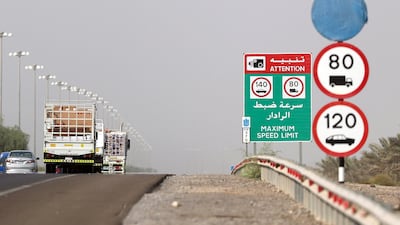There are no plans to remove the speed buffer and unify limits across the UAE's roads, the Federal National Council heard.
Sheikh Saif bin Zayed, Deputy Prime Minister and Minister of Interior, said limits were designed to suit traffic flow in each area.
Sheikh Saif was answering questions from FNC member Adnan Al Hammadi on why speed limits vary on some roads in the UAE.
"The safety of society and people is always our priority," said Sheikh Saif.
"The concerned authorities set the speeds on those roads based on technical reports by road and traffic engineers in each emirate to suit the movement on those roads and traffic flow."
The country has long had a buffer system in place where motorists were allowed to drive 20 kilometres an hour more than the road signs state.
Abu Dhabi abolished this system in 2018 but it is common across the rest of the country.
Other emirates largely have a maximum speed limit of 140kph but this also can vary.
Dubai in 2017 reduced limits on Sheikh Mohammed bin Zayed Road (311) and Emirates Road (611) to 110kph, but the buffer still applies.
“On Emirates Road, the speed varies from Ras Al Kahimah to Dubai - even the fine amount is different,” Mr Al Hammadi said.
He said the 60kph minimum speed was also too low compared with the top speed allowed on roads such as the 611.
“This could disturb traffic flow," Mr Al Hammadi said. "This issue was previously brought up at a session in 2016 and since then everyone has been anticipating a unified speed system.”
Mr Al Hammadi said the speed buffer should be cancelled to avoid confusion and unnecessary fines.
“This [buffer] could be confusing, especially for visitors and tourists, when they see 110kph on the sign they will think this is the limit.
“I personally get distracted when driving from emirate to emirate because all my focus is that when I reach Abu Dhabi I would have to focus on sticking to the limit on the sign.”

However, Lt Gen Dhahi Khalfan, deputy chairman of Police and Public Security in Dubai, who also attended the session on Tuesday, said there was no harm in keeping the buffer.
"It does not hurt [tourists] in any way.”
He said even if drivers, including foreign visitors, understood the limit to be as it is on the sign there would be no harm in that. And if they happened to cross it accidentally, the buffer will be in their benefit.
“If the ruler of a certain emirate wants to keep the buffer, where is the problem in that?”
Brig Hussein Al Harithi, deputy chairman of the Federal Traffic Council, said limits were in place for economic reasons.
"The number of vehicles on the roads in Dubai is 48.6 per cent of the total number of cars on the country’s roads," Brig Al Harithi said.
"And there is a lot of traffic from lorries on its roads, despite having a special [lane for them]. Therefore, the concerned committees decided to set the speed limits in a way that suits the economic movement and commercial transport."
Discussions about the future of the buffer have been talking place for many years. In 2018 a senior Dubai police official said more research was needed before the buffer could be scrapped.
Road safety experts have long called for the removal of the buffer.
“It’s really confusing when you are driving down one part of Sheikh Zayed Road and the signs say you are able to drive at 120kph but you are actually allowed to do an extra 20kph because of a buffer sign,” said Thomas Edelmann, the founder of RoadSafetyUAE.
“Then you come to signs on the same stretch of road that say you can travel at 140kph with no buffer zone.
“There should be the same federal legislation in place right across the country to avoid all this confusion.”
Mr Edelmann also said a 20kph buffer was too high.
"A buffer zone is meant offer a little leeway of a few kilometres in case a speedometer in a car is slightly off,” he said.
"What the speeds are on the signs is what the limit should be. It should be a case of what you see is what you get.
“Tourists are going to return to their own countries having racked up speeding tickets and complaining the system here doesn’t make any sense.”

